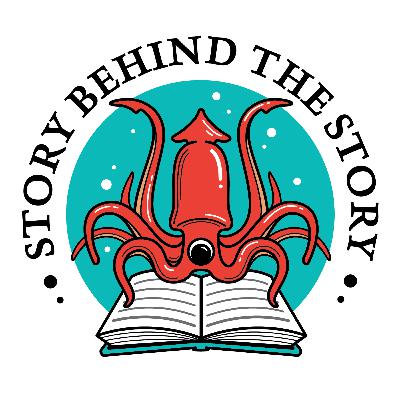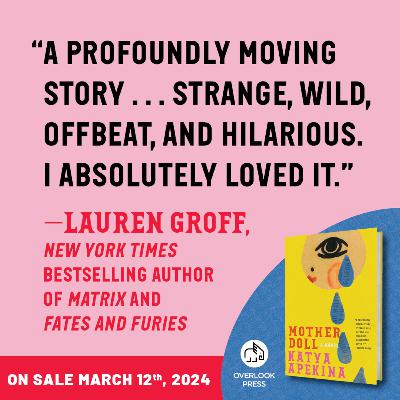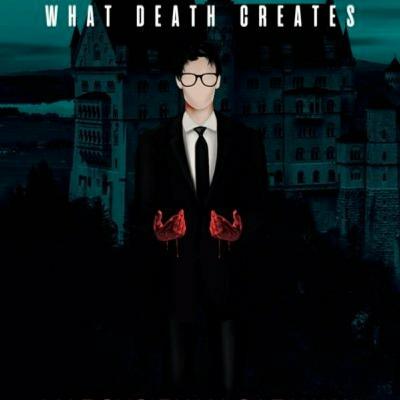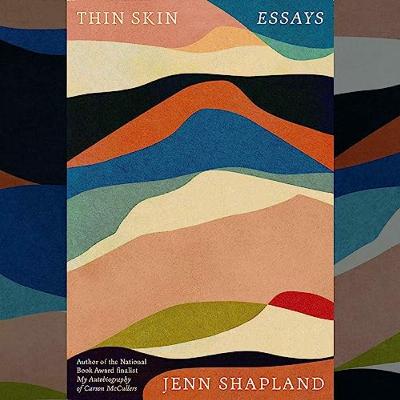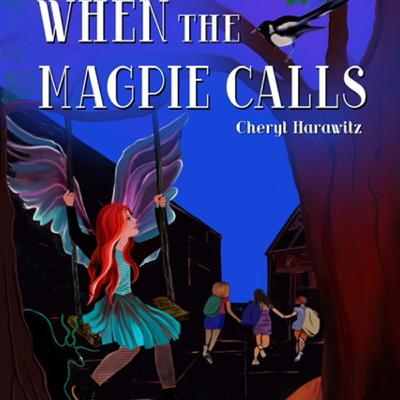Discover Story Behind the Story
Story Behind the Story

57 Episodes
Reverse
Charlie Jane Anders is an award-winning, best-selling author of speculative fiction based in the Bay Area. She is the winner of the 2017 Nebula, Locus, and Crawford awards; winner of the 2020 Locus Award; a co-creator of the transgender Marvel Comics superhero, Escapade; a founding editor of the science fiction website io9 (https://gizmodo.com/io9); a co-host, with Annalee Newitz, of the podcast Our Opinions Are Correct (https://www.ouropinionsarecorrect.com/); and the current science fiction and fantasy book reviewer for The Washington Post.
In this episode, I talk to Charlie Jane about her latest and most personal novel yet. Written during the pandemic, partly as a way of processing her own father's death and her mother's subsequent isolation, Lessons in Magic and Disaster is about a 20-something graduate student in English Literature who teaches her grieving mother how to do magic...with unexpected consequences. In our conversation, we talk about the hidden history of the 18th century novel, LGBTQ activism in the 70s and 80s, the role of community in writing, and so much more.
To learn more about Charlie Jane, or to order a copy of Lessons in Magic and Disaster, visit charliejaneanders.com (https://www.charliejaneanders.com/). Special Guest: Charlie Jane Anders.
Christopher Blackwell is an award-winning journalist currently incarcerated at the Washington Corrections Center, where he is serving a 45-year prison sentence for taking another human’s life during a drug robbery (something he takes full accountability for).
Deborah Zalesne is a legal expert and law professor at the City University of New York School of Law, where she teaches contracts, corporate law, and commercial law.
Together with Dr. Terry Kupers and Kwaneta Harris, they wrote Ending Isolation: The Case Against Solitary Confinement (https://bookshop.org/p/books/ending-isolation-the-case-against-solitary-confinement/0a24fd8bf0aabec1?ean=9780745351278), which weaves together first-hand accounts of incarceration and solitary confinement with legal and medical analyses to illustrate the devastating impacts of solitary confinement on survivors, their families, and the communities they are part of (both inside and outside of prison).
In this episode, I talk to Debbie and Chris about the history of solitary confinement, the legal frameworks that prevent reform from taking root, the challenges and abuses incarcerated individuals face when asserting their rights, and how the realities of solitary confinement differ from how it is portrayed to the public. They also discuss the Journey to Justice Bus Tour (https://journeytojusticetour.com/) they have put together, in partnership with Unlock the Box (https://unlocktheboxcampaign.org/) and Look 2 Justice (https://www.look2justice.org/), to help educate the public about the experience and impacts of solitary confinement.
Alka Joshi spent 10 years working on her debut novel, The Henna Artist, before it was published in March 2020, just before the world locked down as a result of the COVID-19 pandemic. Then, a few months later, Reese Witherspoon selected it as a Reese's book club, changing the trajectory of Joshi's life and writing career forever. At a time when many debut artists were struggling to connect with their audiences, Joshi was zooming into libraries, bookstores, and book clubs big and small, and finding her people in the process.
Five years later, Joshi has published two sequels to The Henna Artist and a new standalone novel, Six Days in Bombay, a coming-of-age novel about an Anglo-Indian nurse who travels Europe to carry out the final wishes of one of her patients. In our conversation, we talk about her whirlwind success, her fascination with the years leading up to India's independence from Britain, the artist who inspired her latest story, and her next project.
In this episode of Story Behind the Story, host Clara Sherley-Appel talks to British novelist Kirsty Capes about her latest book, Daughters, which was recently released in the US following its debut in the UK in 2024 (under the title Girls). Daughters follows Mattie and Nora, whose neglectful and abusive mother was the acclaimed artist Ingrid Olssen. On her deathbed, Olssen asks them to destroy her work, so when Olssen’s sister arranges an exhibition of her art in San Francisco, her daughters feel compelled to put a stop to it — despite their difficult and complicated feelings about their mother.
Our conversation spans Capes' early success as a novelist, her experience in the foster care system, how she brings levity to difficult topics, and more.
In this episode of Story Behind the Story, host Clara Sherley-Appel talks to journalist John Gibler about his 2014 book, Torn from the World: A Guerrilla's Escape from a Secret Prison in Mexico. Torn from the World tells the story of Andrés Tzompaxtle Tecpile, a member of an armed resistance group who was forcibly disappeared and tortured by the Mexican military long after the government claimed it had stopped using these tactics.
Gibler has been reporting on social movements in Mexico since 2006, when he accompanied members of the Zapatista movement on The Other Campaign (https://en.wikipedia.org/wiki/The_Other_Campaign). That experience shaped his understanding of the role of journalists and journalism in resistance movements, and since then, much of his work has focused on chronicling these movements and the violent means states use to suppress them. In addition to Torn from the World, he is also the author of Mexico Unconquered: Chronicles of Power and Revolt (2009), To Die in Mexico: Dispatches from Inside the Drug War (2011), and I Couldn't Even Imagine that They Would Kill Us: An Oral History of the Attacks Against the Students of Ayotzinapa. While he lives and works primarily in Mexico, his reporting has taken him all over Latin America.
Laura Spinney is the author of two novels and three non-fiction books, including Pale Rider, a historical exploration of the 1918 flu epidemic, which came out in 2017. In this interview, we discuss her latest book, Proto: How One Ancient Language Went Global, which traces the evolution of Proto-Indo-European — the hypothetical, reconstructed common ancestor of all languages in the Indo-European language family — from its purported origins with the Yamnaya people of the Pontic steppe through migrations and metamorphoses into nearly 450 languages spoken by 3.4 billion people worldwide today.
Holly Goddard Jones is an author and educator best known for literary fiction. She was a recipient of The Fellowship of Southern Writers’ Hillsdale Prize for Excellence in Fiction and the Rona Jaffe Foundation Writers’ Award, and her work has appeared in several literary publications, including The Best American Mystery Stories, New Stories from the South, and Tin House magazine, in addition to two of her own short story collections and two novels.
In the 2010s, while teaching at a residency in a highly wooded part of Tenessee, Jones was inspired to write a horror story about an insidious species of ticks that carry a horrifying deadly disease. That story became a novel, rooted in the climate crisis, in which Jones explored not just the horror of the ticks themselves, but how the inequities baked into our existing socioeconomic system might look in the face of a serious existential threat.
Muriel Leung is a recipient of fellowships to Kundiman, VONA/Voices Workshop and the Community of Writers, and she has been nominated for the Pushcart Prize. Her writing can be found in The Baffler, Cream City Review, Gulf Coast, The Collagist, and the Fairy Tale Review, among others. Her first book of poetry, Bone Confetti, won the 2015 Noemi Press Book Award. Of it, one reviewer said, “It made the words into a bell, and the bell made me stop what I was doing.” I spoke to Muriel in 2021 about her poetry collection, Imagine Us, the Swarm, in which she explored racialized labor and the death of her father.
In this episode, I talk to Muriel about her debut novel, How to Fall in Love in a Time of Unnameable Disaster, which came out this past October. It follows Mira, a 20-something queer woman living in a New York City beset by weekly acid rainstorms, as she moves in with her mother and grieves the death of her girlfriend, who refused to leave the deteriorating apartment they both shared.
Hilary Leicther's particular brand of surrealist fiction takes metaphors and makes them tangible. Her debut novel, Temporary, followed a nameless, archetypal temp worker from one gig to the next. As the jobs grow progressively stranger, their strangeness bleeds into her personal life. In this episode, I talk to Leichter about her new novel, Terrace Story, in which a struggling family find a spacious terrace — one that seems to defy the laws of physics — behind the linen closet of their tiny, New York apartment. It is a novel about the impact each of us has on the world around us, and the hidden depths we all contain.
Hanna Pylväinen has been writing fiction about the small Finnish fundamentalist sect she was raised in for years. In her 2012 debut novel, We Sinners, she follows a large, Midwestern family as they navigate their relationships to each other and to the church at the heart of their lives. Over the years since she wrote that novel, Pylväinen has learned more about the origins of that religious order, called Laestadianism after the pastor who founded it, and its relationship to the colonization of Finland and displacement of the Sami people and their traditions. Her new novel, The End of Drum-Time, takes a new look at Laestadianism, exploring the dynamics of imperialism, the instrumentalization of religion in settler-colonialism, and the limitations on our ability to see past our own perspective.
In 2014, hot on the heels of the success of his Magicians trilogy, Lev Grossman announced that he was writing a Arthurian epic. As the project took shape, world events kept intruding: Donald Trump ascended to the presidency, a novel respiratory virus launched a pandemic, and Britain exited the European Union. Admist all this, Grossman realized that the question that had driven him to write this novel in the first place — What happens after Arthur dies? — was a question about the collapse of empires. And so The Bright Sword was reborn.
In this interview, I talk to Lev about the politics of Camelot, the difficulty of seeing the themes that are present in your own work, and the difficulty of tracking changes across a 700-page tome. Special Guest: Lev Grossman.
For ten years, Tanzila "Taz" Ahmed organized an annual poem-a-day project during the month of Ramadan. She began the project as an alternative form of reflection to prayer, which she had struggled to connect with, shortly after the death of her mother. In the decade that followed, the project turned into a community, and Taz's poetry turned into a collection, Grasping at This Planet Just to Believe.
In this interview, Taz talks about the impetus behind and inspiration for the original project and the ways participating in it for a decade changed her relationship to Ramadan — and to writing.
Tedd Siegel retired from his career as an academic administrator in late 2019 after wrestling with extreme stress, burnout, and PTSD — caused, in part, by the conditions of work as it is formulated today. He wrote Signs of the Great Refusal: The Coming Struggle for a Postwork Society in part to work through his own experiences and, more broadly, to understand what it was about contemporary work that felt so untenable and unsustainable. Throughout the book, Tedd leans into his background as a political philosopher (he attended the Ph.D. program in philosophy at the New School), grounding his understanding of “work-as-we-know-it” in the political and economic critiques of capital going back to Marx in the 19th century, putting them into dialog with philosophical understandings of work and labor in the 20th century from Arendt and others. The result is an exploration not only of the role and function of work in contemporary society, but what it might take to build a post-work politics out of the nascent anti-work movements alive today.
Novelist, screenwriter, and translator Katya Apekina returns to Story Behind the Story to talk about her latest novel, Mother Doll — an intergenerational ghost story, tying together a Russian revolutionary and her great-granddaughter, adrift in her 20s in LA. Special Guest: Katya Apekina.
Marcus Gazaway got his start as a writer right here on the central coast, when he joined the staff of CSU Monterey Bay’s student newspaper, The Otter Realm (https://digitalcommons.csumb.edu/otterrealm/). Today, he works as a full-time author in Sarasota, Florida, where he can be seen reading and writing in coffee shops across the Gulf Coast. His first novel, the sci-fi thriller Bridgewater, follows a neurologist whose desperation to give his Deaf daughter a voice leads him down a dark and destructive path. It is the topic of our conversation today.
This month, host Clara Sherley-Appel talks to poet and educator Xochitl-Julisa Bermejo. A former Steinbeck Fellow and Poets & Writers California Writers Exchange winner, Xochitl’s writing has been featured in the Academy of American Poets’ Poem-a-Day, On Being’s Poetry Unbound, and Poetry Unbound: 50 Poems to Open Your World. She has received residencies from Hedgebrook, Ragdale, Yefe Nof, and the National Parks Arts Foundation in partnership with the Getty National Military Park and Poetry Foundation. In 2011, she co-founded Women Who Submit (https://womenwhosubmitlit.org/), a literary organization that uses social media and community events to empower women and non-binary authors to submit work for publication, with Ashaki Jackson and Alyss Dixon, and she currently serves as the organization’s director.
Xochitl wrote her debut collection, Posada: Offerings of Witness and Refuge (https://bookshop.org/p/books/posada-offerings-of-witness-and-refuge-xochitl-julisa-bermejo/10553534), while living in a house in the shadows of Dodger Stadium in historic Solano Canyon. Today we are discussing her second collection, Incantation: Love Poems for Battle Sites (https://www.mouthfeelbooks.com/product/Incantation-love-poems-for-battle-sites/57), which explores US monuments, memorializes Black and brown bodies murdered by state-sanctioned violence, and shares love poems to family, friends, and dalliances in rituals of resistance and resilience.
Sam Sax is a queer Jewish poet, writer, and educator. Their debut poetry collection, madness, won the National Poetry Series Competition when it came out, and their second collection, bury it, won the 2017 James Laughlin Award from the Academy of American Poets. They are the two time Bay Area Grand Slam Champion with poems published in The New York Times, The Atlantic, Poetry Magazine, and Granta, to give just a few highlights. Sam has received fellowships from The National Endowment for the Arts, The Poetry Foundation, Yaddo, Lambda Literary, and MacDowell, and they are currently serving as an ITALIC Lecturer at Stanford University.
In this conversation, Clara talks to Sam about the purpose of filth in their poetry, their use of histories and etymologies as poetic techniques, and how to write a pandemic poem that doesn't feel dated. Special Guest: Sam Sax.
Jenn Shapland's first book, My Autobiography of Carson McCullers, was a finalist for the 2020 National Book Award and the Southern Book Prize, and it won the 2021 Lambda Literary Award, the Judy Grahn Award, and the Christian Gauss Award. In her new essay collection, Thin Skin, Shapland explores the porousness of boundaries between humans and the environments we inhabit, between us and other people, and between us and the social constructs we create.
What does it mean to be sensitive when we live in a toxic environment? How do we navigate the difference between taking responsibility and assuaging our guilt? Between resisting injustice and coping with it? And how do we reckon with what's happening in the world when no one wants to talk about it? Shapland answers these questions and more in this month's episode of Story Behind the Story.
Special Guest: Jenn Shapland.
Host Clara Sherley Appel speaks with Brett Christophers, author of Rentier Capitalism.
A geographer based out of the Institute for Housing and Urban Research at Uppsala University, Brett's work focuses on various aspects of Western capitalism, both historically and in the present day. In 2018, he wrote The New Enclosure, about Margaret Thatcher’s immensely successful program to privatize land in the UK, for which he won the 2019 Isaac and Tamara Deutscher Memorial Prize. In 2020 he published Rentier Capitalism, which provides a framework for understanding the political economy of the 20th and 21st centuries in terms of the extraction of rents by the haves from the have nots, and explores the consequences of an economic system that incentivizes private ownership on a massive scale.
Though the focus of Christophers' book is on the UK, he extends his analysis to California's housing crisis as part of this conversation, making it essential listening for anyong seeking to understand the damage that has been done during the neoliberal era — and what is necessary to undo it. Special Guest: Brett Christophers.
Cheryl Harawitz is an artist and retired social worker living in Alameda. A few years ago, she published her debut middle-grade novel, When the Magpie Calls, the story of a nine year old girl named Morgwyth with special abilities and a remarkable connection to animals, for which she is bullied by her peers and targeted by supernatural forces who see her as a threat. But as Morgwyth begins to accept herself and her differences, she discovers a wellspring of internal strength that serves her well in her adventures.
This month's conversation covers a range of topics, from Cheryl's process in writing and editing her novel to the purpose of art — literary and otherwise — in her life to the influence of her professional experiences as a social worker on the kinds of stories she seeks to tell.
Special Guest: Cheryl Harawitz.


